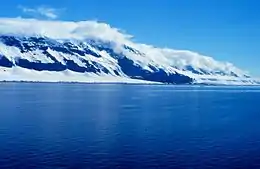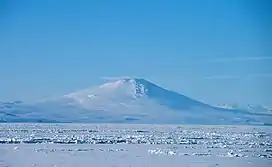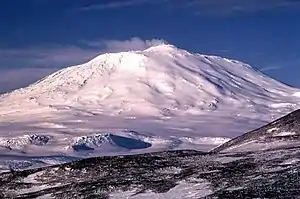McMurdo Volcanic Group
The McMurdo Volcanic Group is a large group of Cenozoic volcanic rocks in the western Ross Sea and central Transantarctic Mountains areas of Antarctica.[1] It is one of the largest provinces of alkaline volcanism in the world, having formed as a result of continental rifting along the West Antarctic Rift System.[1][2] The McMurdo Volcanic Group is part of the Western Ross Supergroup, a stratigraphic unit that also includes the Meander Intrusive Group.[3]
| McMurdo Volcanic Group | |
|---|---|
| Stratigraphic range: Cenozoic | |
| Type | Group |
| Unit of | Western Ross Supergroup |
| Sub-units | Erebus Volcanic Province, Hallett Volcanic Province, Melbourne Volcanic Province |
| Lithology | |
| Primary | Volcanic rocks |
| Location | |
| Region | Antarctica |
Subdivisions
Three subprovinces comprise the McMurdo Volcanic Group, namely the Hallett, Melbourne and Erebus volcanic provinces.[1] The Balleny Volcanic Province along the Balleny Fracture Zone in the Southern Ocean was originally defined as part of the McMurdo Volcanic Group but is now excluded due to its location on oceanic crust with no obvious geographic or tectonic relationship to the other McMurdo volcanic provinces.[4][5]
Hallett Volcanic Province

The Hallett Volcanic Province in northern Victoria Land is situated along the margin of the Transantarctic Mountains.[1][6] It consists of a 260 km (160 mi) long chain of four major elongated shield volcano complexes that were originally interpreted to have erupted subglacially under a larger Antarctic ice sheet. Later studies showed that they erupted in a subaerial environment instead.[1]
Volcanoes
Melbourne Volcanic Province

The Melbourne Volcanic Province is also in northern Victoria Land and forms an arcuate band extending from the Ross Sea coast into the Transantarctic Mountains.[1][6] It consists of large volcanic centres and small but widely distributed basaltic vents.[1]
Volcanoes
Erebus Volcanic Province

The Erebus Volcanic Province is in southern Victoria Land.[1][6] It includes marine volcanic centres in the southwest Ross Sea, major volcanic complexes in southern McMurdo Sound and several small basaltic centres in the McMurdo Dry Valleys, as well as along the foothills of the Royal Society Range.[1]
See also
References
- Riffenburgh, Beau (2007). Encyclopedia of the Antarctic. Vol. 1. Taylor & Francis. p. 639. ISBN 978-0-415-97024-2.
- Bargagli, R.; Broady, P.A.; Walton, D.W.H. (12 May 2004). "Preliminary investigation of the thermal biosystem of Mount Rittmann fumaroles (northern Victoria Land, Antarctica)". Antarctic Science. 8 (2): 121. doi:10.1017/S0954102096000181 – via Academia.edu.
- "McMurdo Volcanic Group". Government of Australia. Retrieved 2020-03-20.
- Kyle, P. R.; Cole, J. W. (1974). "Structural control of volcanism in the McMurdo Volcanic Group, Antarctica". Bulletin of Volcanology. Springer. 38: 16. doi:10.1007/BF02597798. S2CID 128623239.
- Lanyon, Ruth (1994). Mantle reservoirs and mafic magmatism associated with the break-up of Gondwana: the Balleny Plume and the Australian-Antarctic discordance: U-Pb zircon dating of a Proterozoic mafic dyke swarm in the Vestfold Hills, East Antarctica (PhD). La Trobe University. p. 165.
- Faure, Gunter; Mensing, Teresa M. (2010). The Transantarctic Mountains: Rocks, Ice, Meteorites and Water. Springer. p. 519. ISBN 978-1-4020-8406-5.